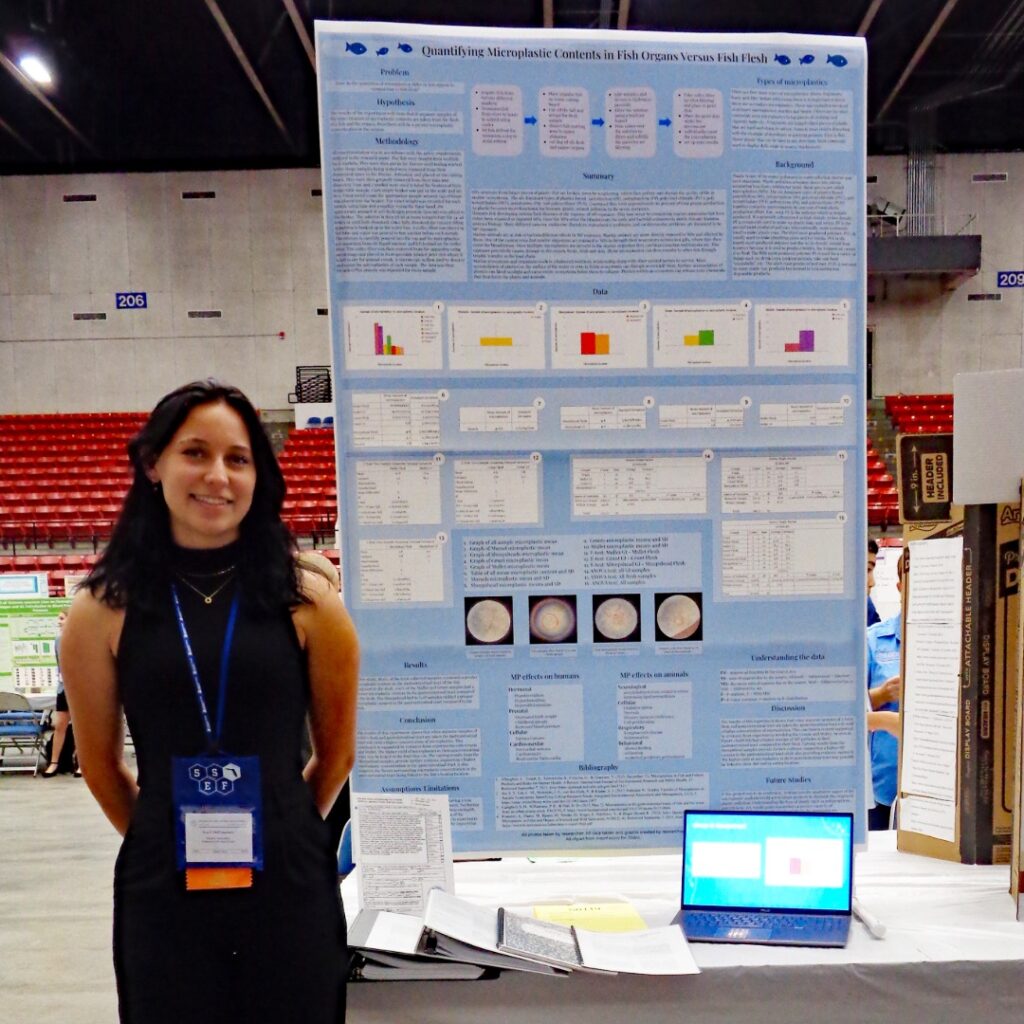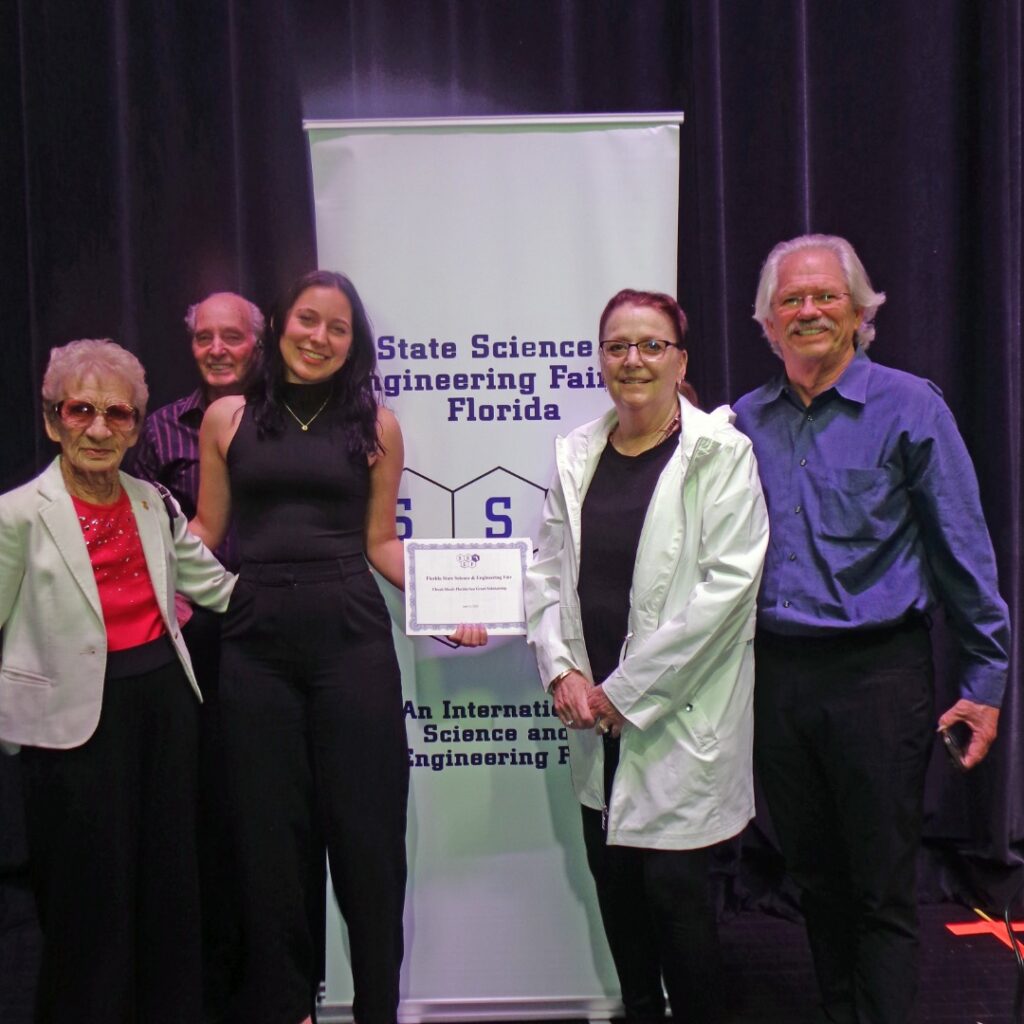
Ava DeFrancesco was selected as the 2024 Skoch Scholarship recipient. Image by Sue Cole.
Each year, Florida Sea Grant selects an outstanding high school senior competing in the State Science and Engineering Fair of Florida to receive the Chuck Skoch Scholarship The scholarship recognizes promising young researchers in coastal or marine science-related fields. Funding for the scholarship is provided by the Skoch family of Boynton Beach, in memory of Charles “Chuck” Skoch, an avid fisherman, boat captain, and Florida resident.
This year’s scholarship was awarded to Ava DeFrancesco, a senior at Edgewood Junior Senior High School in Merritt Island, Florida. For her award-winning project, DeFrancesco focused on quantifying the difference in plastics found in the gastrointestinal tract compared to the flesh of different fish.
“Before my tenure at the University of Florida and Florida Sea Grant, I processed over 4,000 fish stomachs, so Ava’s science fair project immediately piqued my interest when I saw fish guts on her display,” says Brittany Hall-Scharf, UF/IFAS Florida Sea Grant Extension Agent in Hernando County and Florida Sea Grant representative in the Skoch Scholarship selection process.
“As someone who also loves fish and knowing Chuck Skoch’s passion was for fishing, I felt Ava’s project was a perfect tribute to his memory, making her a deserving recipient of this scholarship.”
For her research, DeFrancesco retrieved three types of fish from a local market: mullet, white grunt, and sheepshead. The research involved taking samples from the flesh around the tail area, the stomach, and the large intestine.
“Growing up in Melbourne, Florida, just 25 minutes away from the beach, I developed a love for fish and fresh seafood,” says DeFrancesco. “With the increasing publicity of microplastic pollution and its effects on marine life, I wanted to investigate if these plastics could transfer to humans through consumption. I wanted to see if the gastrointestinal tract had more microplastics than the flesh.”
DeFrancesco used hydrogen peroxide to dissolve the fat in the tissue, then funneled the samples through a coffee filter with distilled water. After drying the samples for one to two weeks to avoid mistaking moisture for microplastics, she counted the particles using a microscope and pressed down on each particle with a micro-probe to see if it would break, signaling it was organic matter and not microplastics.
Her findings revealed that mullets had the highest levels of microplastics in both the gastrointestinal tract and flesh. Surprisingly, sheepshead, which she expected to have high levels due to their diet of crabs, showed lower microplastic content than mullets and grunts.
With the increasing publicity of microplastic pollution and its effects on marine life, I wanted to investigate if these plastics could transfer to humans through consumption.
Ava DeFrancesco

Ava DeFrancesco with members of the Skoch Family. Image by Sue Cole.
Looking ahead, DeFrancesco expressed interest in expanding her research by including fish that are more commonly consumed, using larger sample sizes, and exploring different methods of extracting microplastics, including surgical approaches, which could reduce the chances of dissolving the microplastics in the samples.
“Talking to the judges also gave me new perspectives, such as the impact of using wild-caught fish to feed farmed fish, and the need for solid controls using tank-raised fish and these are some areas of potential research for the future”.
The project has also influenced her habits regarding microplastic consumption.
“While I still use plastic straws and consume food packed in plastic, my research has made me more conscious about reducing plastic use,” says DeFransceso.
In addition to her academic pursuits, Ava DeFrancesco is actively involved in extracurricular activities. She is the treasurer of the National Art Honor Society, a member of the National Honor Society, and the vice president of Future Educators of America. She also participates in several AP and dual enrollment classes.
DeFrancesco is committed to Florida State University through the Pathways Program. Enrolling in the fall semester of 2024, she plans to major in Chemistry with a career focus in pharmaceuticals. She anticipates seeking other research opportunities.
“This research opened my eyes to the joy of experimentation and the potential for furthering research through different avenues.”